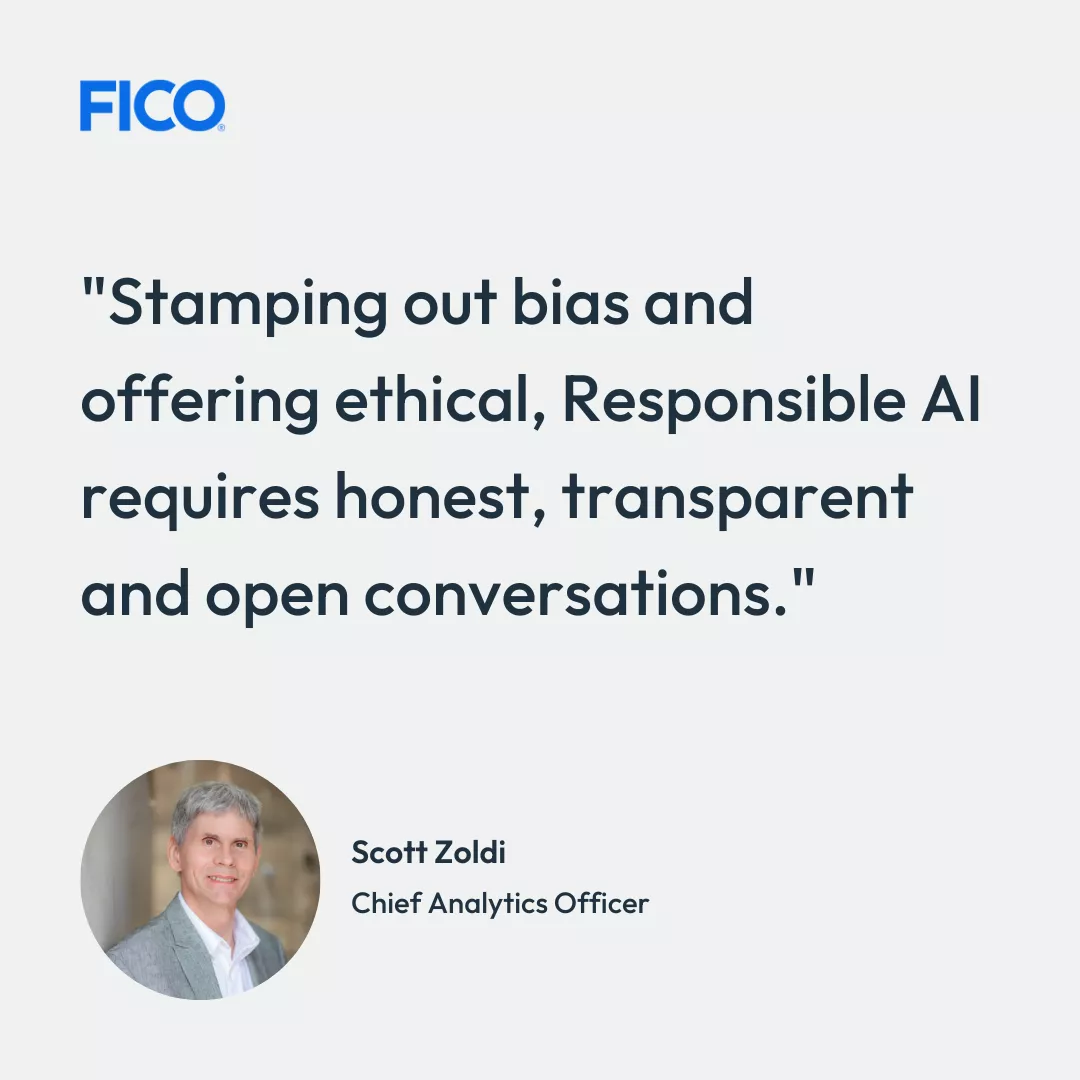Using AI and Data Science to Fight Bias and Drive Opportunities
FICO’s expansion of its Educational Analytics Challenge and Responsible AI collaboration with customers globally can improve transparency and economic outcomes

As a data scientist, I’m always intrigued by the details of the artificial intelligence (AI) and machine learning (ML) innovation my team at FICO is constantly producing. As a student of life, I’m in awe of the impact AI innovation can have on society. And as an executive, I’m thrilled to be able to catalyze some of that impact and deploy meaningful change.
Two of my favorite endeavors of 2023 — FICO’s Educational Analytics Challenge designed for students at historically black colleges and universities (HBCU), and my Responsible AI collaboration with FICO customers and other organizations in Brazil, India and elsewhere — bring to life how Responsible AI is real, and how AI can drive positive and incredible change. In 2024 we’re expanding the FICO Analytics Challenge to include more schools, and I’m looking forward to exploring data science that can drive economic opportunities at profound individual and societal levels.
Why Diversity Matters in Data Science
We created the FICO Educational Analytics Challenge to help improve diversity in data science by jumpstarting more HBCU students’ involvement in the data science field. Access is key. The FICO Educational Analytics Challenge introduces students not just to core data science concepts, data sets and problem-solving; even more critical, it provides access to practitioner mentors. I very much enjoyed my conversations with students and faculty at Bowie State University and Alabama A&M University, and am proud of the FICO data scientists who have and will serve as mentors to these and upcoming student participants.
Last week we expanded the FICO Analytics Challenge to an additional HBCU, Delaware State University, where I received a warm welcome from faculty, students and staff – see here.
Why does diversity matter? In any field the stock answer is, “More and different voices lead to better solutions.” Let me double-click on that to explain how this broad answer plays out in data science.
Democratizing the field gets more students involved in data science problems that have historically affected them, such as bias in housing data, but in which their diverse voices were not heard. Providing transparency, exposure and guidance to these budding data scientists helps ensure that their voices are just not heard; they become part of the solution, advocating for change that benefits their communities and each other.

An Active Role in Stamping out Data Bias
In data science, different voices bring different perspectives. For example, I was impressed by how the Bowie State students were thinking about tract housing data. They pointed out that large amounts of tract housing on any given land parcel can be a proxy for race, and perhaps that data shouldn’t be used in an analytic loan originations model because it could impute bias. Other data scientists ultimately may have come to the same conclusion, but the eventual conversation would likely be missing that honest, passionate introspection.
Stamping out bias and offering ethical, Responsible AI requires honest, transparent and open conversations; too often organizations want to talk about bias in an abstract way, not in the way that is directly impacting communities. As they worked through the analytics challenge, the students began to understand that by addressing bias in one group, they impact another. They also understand there’s no magic key to ending bias; it’s an evolutionary process that requires transparency and might take generations of AI models or data scientists to get to the right place. To be heard, the students recognize that they need to be part of that process, advocating and representing their communities. At FICO we are honored to take on the responsibility to empower and better prepare them to face these challenges in the field. In 2024 the FICO Educational Analytics Challenge will continue to help Black students find their voice.
How Responsible AI Helps Economies Grow
In 2023 I also had the privilege of sharing my ideas on Responsible AI with customers, colleagues and government organizations in Brazil, India and other countries, and continued learning from their perspectives. Many of these countries have gone through incredible large-scale digitization efforts, enabling new financial and payments systems and subsequent societal applications of AI. For example, Brazil presents a powerful case study for Responsible AI; over the past several years Brazil has made financial inclusion and transparency a national focus, to grow the economy and improve financial outcomes for individuals.
Brazil has enthusiastically embraced new technology to achieve these goals; FICO’s partner Belvo is using Responsible AI to power its open finance platform, providing life-changing access to credit to people who are completely unbanked. Consumer access to credit is proven to stimulate economies, and companies like Belvo are helping lenders responsibly extend credit to consumers who otherwise would not have options.
India presents another fascinating opportunity for economic growth. While credit card penetration in India is low (5.5% of the population, or 77 million people) compared to the US, where 82% of adults have at least one credit card, more than 78% of Indian citizens over age 15 have a bank account. Furthermore, India’s Unified Payments Interface (UPI) is driving broad digitization of payments, transforming cash-based societies into digital economies. UPI allows digital histories to be captured, enabling responsible participation in the financial system; huge portions of the society that were previously unbanked now create digital payment data streams that will fuel AI-driven decisioning models, driving better economic outcomes for all citizens.
Of course, fraudsters and scammers will be working overtime to exploit the massive adoption of digital payments globally. In 2024, I look forward to continuing to fight fraud, scams and financial crimes with innovations like the FICO Scam Detection Score, which identifies 24 times more scam transactions than a standard fraud detection model. We are always working to further improve the models we deploy, kicking off 2024 product announcements at the Fraud Forum this week in Indonesia, where I’ll present FICO’s latest Retail Banking Fraud / Scam model innovation to some of our fantastic clients in the APAC region.
Onward with Blockchain
Finally, in 2024 I plan to continue evangelizing the use of blockchain technology for Responsible AI and analytic model management governance. In 2023 FICO received a U.S. patent for this AI innovation, and I was honored to represent FICO in accepting a related Innovator award from Global Finance Magazine. Last week I was further energized to keep promoting this novel solution, which will be wrapped into FICO® Platform and available to customers, when I was featured in The Wall Street Journal, talking about AI and blockchain in “AI Has a Trust Problem. Can Blockchain Help?” I think you know my answer to that!
Cheers to an exciting 2024! Follow me on LinkedIn and X @ScottZoldi.
How FICO Can Help You with Responsible AI
- Read about FICO’s Blockchain Award - How to Use Blockchain to Build Responsible AI: An Award-Winning Approach
- Learn more at FICO® Responsible AI
- Download our AI Playbook: A Step-by-Step Guide for Achieving Responsible AI
- Review The State of Responsible AI in Financial Services
Popular Posts

Business and IT Alignment is Critical to Your AI Success
These are the five pillars that can unite business and IT goals and convert artificial intelligence into measurable value — fast
Read more
Average U.S. FICO Score at 717 as More Consumers Face Financial Headwinds
Outlier or Start of a New Credit Score Trend?
Read more
Average U.S. FICO® Score at 716, Indicating Improvement in Consumer Credit Behaviors Despite Pandemic
The FICO Score is a broad-based, independent standard measure of credit risk
Read moreTake the next step
Connect with FICO for answers to all your product and solution questions. Interested in becoming a business partner? Contact us to learn more. We look forward to hearing from you.
